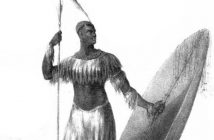
Born on 1798 in the right-hand house of Xhosa chief Ngqika, King of the Rharhabe division of the Xhosa people. Throughout his life, he was opposed to his father’s strategy of ceding land to the Cape Colony; as a result, in 1822, he went back into the Neutral Zone in order to establish his own chiefdom. The Sixth War is known as Hintsa’s War by the Xhosa.However,Hintsa did not instigate the war and,although he gave support to the Xhosa armies which were involved, it was Chief Maqoma who was the primary leader of the Xhosa forces.
Background: On the Cape’s eastern border (now the Keiskamma River) insecurity persisted. Particularly as the Xhosa on the other side of the border were under considerable pressure from forces further east such as the effects of the expanding Zulu Empire. Although highly unstable, the frontier region was seeing increasing amounts of cultural diversity, with Europeans, Khoikhoi and Xhosa living and trading throughout the frontier region.
Outbreak: Local Cape responses to the Xhosa cattle raids varied, but in some cases were drastic and violent. On 11 December 1834, a Cape government commando party killed a chief of high rank, incensing the Xhosa: an army of 10,000 men, led by Maqoma, swept across the frontier into the Cape Colony, pillaged and burned the homesteads and killed all who resisted. Among the worst sufferers was a colony of freed Khoikhoi who, in 1829, had been settled in the Kat River valley by the British authorities. Refugees from the farms and villages took to the safety of Grahamstown, where women and children found refuge in the church.






